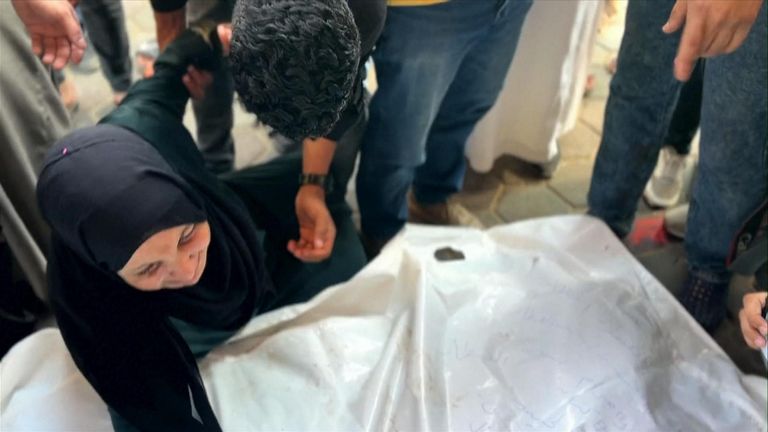The mother and her six children were killed early Sunday on their house in the town of Deir al-Balah, according to the al-Aqsa Martyrs hospital.
Agency Report

A devastating Israeli airstrike hit central Gaza, claiming the lives of 19 Palestinians, including a mother and her six children. The tragic incident, reported early Sunday by Palestinian health authorities, highlights the rising toll of the conflict.
According to the al-Aqsa Martyrs Hospital, the youngest child was just 18 months old, and the others included quintuplets aged 10. Families gathered at the hospital, mourning the loss of their loved ones amid scenes of gut-wrenching grief.
The current wave of violence erupted last year’s October 7, when Hamas militants launched an unprecedented assault on Israel, killing approximately 1,200 people and taking around 250 hostages. This triggered Israel’s military response, which has led to massive casualties among civilians.
“What was their crime?” asked Mohammad Khattab, grieving for his neighbors, the victims of the airstrike. “Did they kill any Jews? Did they shoot at the Jews? Will this bring security to Israel?” His rhetorical questions voiced the agony felt by many living through this turmoil.
Since the military campaign began, more than 40,000 Palestinians have died, mostly civilians, according to Palestinian health authorities. Amidst the destruction, Gaza itself has been transformed, with countless neighborhoods reduced to rubble.
Despite the tragic loss of the mother and her children, Israel claimed it only targets Hamas militants and attributes civilian casualties to Hamas’s tactics of hiding fighters and weapons within residential areas. Critics argue this logic has led to numerous innocent lives lost.
The mourning intensified as news swept through families and neighborhoods about the attack, turning previously vibrant homes and streets to ones filled with sorrow. The collective despair has become palpable as hundreds attended the funerals, processing this national tragedy.
Many families are now left with the heartbreaking task of caring for orphans and those left behind without parents. The grave consequences of war demand attention as uncertainty looms over the fate of Gaza’s children.
The widespread fatalities have ignited outrage and desperation among the Palestinian people as they struggle with the ever-present threat of violence. Amid these circumstances, the threat of famine and outbreaks of diseases such as polio is more imminent than ever.
U.S. Secretary of State Antony Blinken is reportedly visiting the region amid these tensions, hoping to broker a ceasefire. Mediators from Egypt and Qatar are also involved, trying to negotiate terms but facing resistance from Hamas, which demands specific conditions be met.
During the same attack, over 29 people were reportedly killed across Gaza, including several children, leading to calls for accountability. Families and witnesses have gathered, sharing shocking narratives of their experiences during airstrikes.
“These children have turned to remains. What did they do?” pleaded the children’s grandfather, speaking on behalf of countless grieving relatives and families across the region.
Reports indicate the lethal airstrikes continued, and widespread devastation remains chronic as the conflict escalates. Residential areas continue to suffer disproportionately as the fallout from military actions plays out with painful consequences.
Week after week, the bombardments shield no one from their wrath. The emotional and physical toll on families and everyday lives can scarcely be measured.
Local officials express deep concern for the future of those still alive, especially children who now face unimaginable hardships from the losses incurred. Urgent action is necessary as voices cry out to the international community for relief and intervention.
During public gatherings and memorials, communities unite to share their pain, fostering solidarity as they cope with grief together. Each lost life echoes through the streets of Gaza, leading many to demand justice for the fallen.
Despite allegations against Hamas’s conduct during the conflict, the sheer number of civilian deaths raises ethical concerns about the war’s human cost. Reflecting on recent strikes, many question the priorities of warring parties.
The relentless violence has left many feeling trapped, hope has become scarce, and it appears the situation holds no clear resolution. The air has been thick with sorrow, yet resilient spirits persist among those who remain.
Calls for peace resonate but come alongside reports of Israeli officials’ cautious optimism about ceasefire discussions. Diplomatic efforts continue amid rising tensions, but significant obstacles remain as violence perpetuates discord.
The topic of safety has become contentious, with staunch disagreements over what constitutes security and at whose expense it should come. Each attack sparks new rounds of debate on the ethics of warfare and its humanitarian impacts.
Reportedly, as death tolls rise, humanitarian aid efforts come under scrutiny, and initiatives seem inadequate compared to the urgency of the situation. Relief organizations express frustration at the continual flow of casualties amid stalled negotiations.
What happens next may depend on the complexity of negotiations involving multiple nations, each possessing diverse interests and stakes within Gaza and Israel. Through it all, the plight of innocent civilians remains at the heart of this crisis.
Family members of those killed have begun to navigate life without their loved ones, embodying resilience amid tragedy. Yet collective mourning raises pivotal questions for the broader international community.
Each strike not only erases lives but also impacts the nation’s psyche and future. Finding the way forward appears more elusive than ever, with both sides locked deep within conflict.
Public figures and organizations worldwide have expressed their condolences, but actions and advocacy for peace seem scant against the growing backdrop of grieving nations. Voices unite with calls for justice, demanding a comprehensive response to this humanitarian crisis.
The heart-wrenching loss of families like the one from Deir al-Balah reveals the harsh realities of war, underscoring the urgent need for collective action. Events of the past few days exemplify the compounding tragedy affecting generations both now and within the future.
